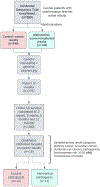"I don't need any more unknowns hanging over my head": Views of patients with cancer on variants of uncertain significance and low/moderate risk results from genomic sequencing
- PMID: 37577963
- PMCID: PMC11262616
- DOI: 10.1016/j.gim.2023.100960
"I don't need any more unknowns hanging over my head": Views of patients with cancer on variants of uncertain significance and low/moderate risk results from genomic sequencing
Abstract
Purpose: We sought to explore patient-reported utility of all types of cancer results from genomic sequencing (GS).
Methods: Qualitative study, using semi-structured interviews with patients who underwent GS within a trial. Thematic analysis employing constant comparison was used. Two coders coded transcripts, with use of a third coder to resolve conflicts.
Results: 25 patients participated: female (22), >50 years (18), European (12), Ashkenazi Jewish (5), Middle Eastern (3), or other ethnicity (5), with breast cancer history (20). Patients' perceptions of the utility of cancer GS results hinged on whether they triggered clinical action. For example, when patients were enrolled into high-risk breast cancer surveillance programs for low/moderate risk breast cancer genes, they perceived the results to be very "useful" and of moderate-high utility. In contrast, patients receiving low/moderate risk or primary variants of uncertain significance results without clinical action perceived results as "concerning," leading to harms, such as hypervigilance about cancer symptoms. Overall, having supportive relatives or providers enhanced perceptions of utility.
Conclusion: Patients' perceptions of cancer GS results hinged on whether they triggered clinical management. Consequently, patients who received results without clinical action became hypervigilant, experiencing harms. Our findings call for a need to develop practice interventions to support patients with cancer undergoing GS.
Keywords: Clinical utility; Genomic sequencing; Health services research; Hereditary cancer syndromes; Patient-reported utility.
Copyright © 2023 American College of Medical Genetics and Genomics. Published by Elsevier Inc. All rights reserved.
Conflict of interest statement
Conflict of Interest The authors declare no conflicts of interest.
Figures


References
-
- Lindor NM, McMaster ML, Lindor CJ, Greene MH, National CancerInstitute. Division of Cancer Prevention, Community Oncology and Prevention Trials Research Group. Concise handbook of familial cancer susceptibility syndromes. J Natl Cancer Inst Monogr. 2008:1–93. 10.1093/jncimonographs/lgn001 - DOI - PubMed
-
- Idos G,ValleL.Lynch syndrome.GeneReviews.2021.
Publication types
MeSH terms
Grants and funding
LinkOut - more resources
Full Text Sources
Medical
Miscellaneous

